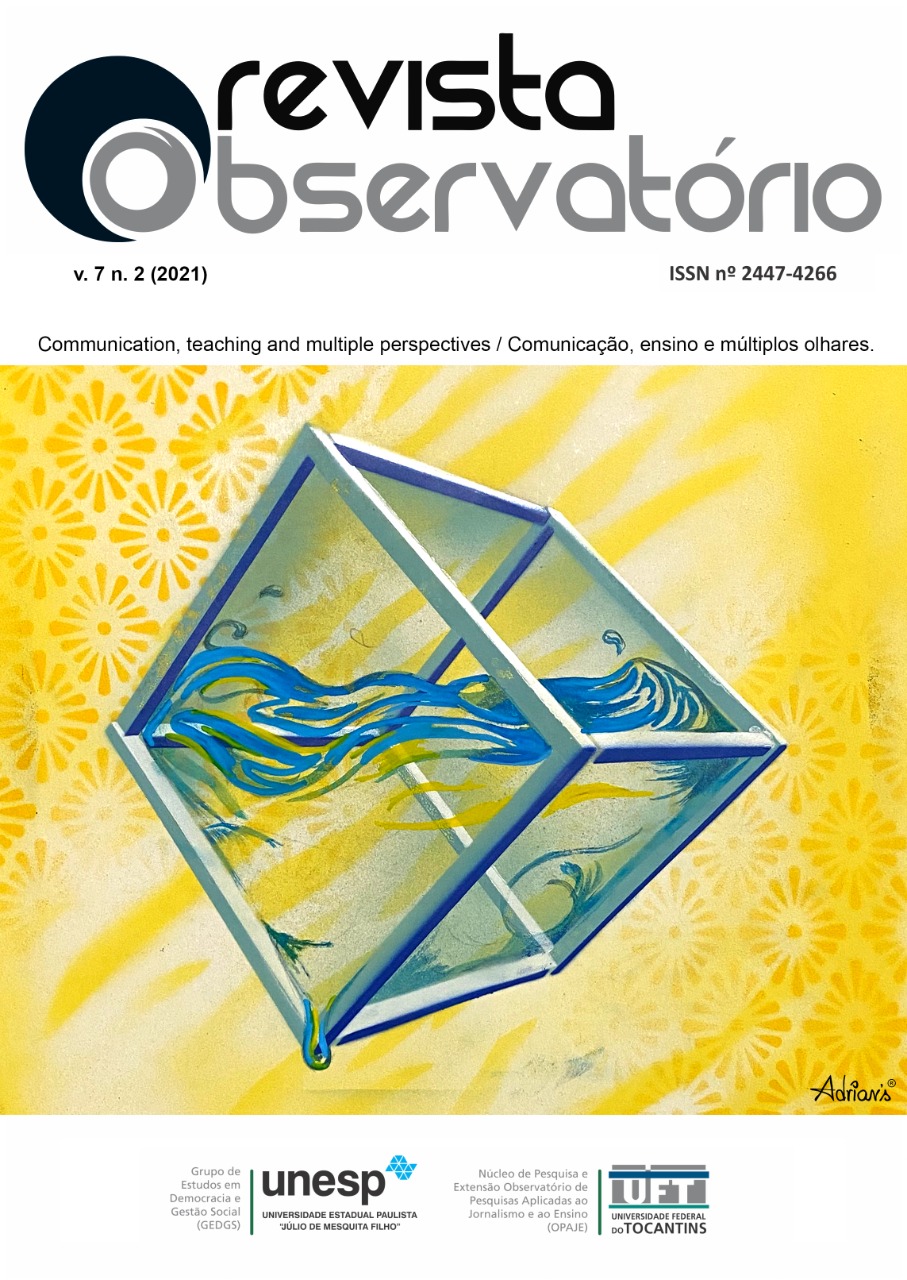Evaluación del Nivel de Competencia Digital de los Docentes de los Institutos Federales del Estado de Maranhão
DOI:
https://doi.org/10.20873/uft.2447-4266.2021v7n2a3enPalabras clave:
Education, Technology, Teacher, Digital competenceResumen
This scientific investigation aims to evaluate the relationship between technology and digital competences in education in the teaching-learning process in educational institutions in the contemporary world, whose fundamental function is the intellectual and professional training of the subjects. In this sense, the work entitled “Evaluation of the level of digital proficiency of teachers at Federal Institutes of Maranhão”, sought to assess the level of digital proficiency of teachers at Campi of Federal Institutes in the State of Maranhão. The questionnaire proposed by DigCompEdu “CheckIn” EU Science Hub (Science Center of the European Union) was used to analyze the self-reflection of professors at Federal Institutes in the State of Maranhão.
Descargas
Citas
ALMEIDA JÚNIOR, Raul Marcelino de. Distance learning and new technologies. Primus Vitam Magazine – No. 5 – 1st September 2013.
BARBETTA, Pedro Alberto. Statistics applied to social sciences. 8th ed. rev. – Florianópolis, Ed. of UFSC, 2012.
BRAZIL. Law of Guidelines and Bases of Education. Department of Education and Sports. Brasilia, 1996.
DIAS-TRINDADE, S. Digital learning environments, communities of practice and mobile devices. In Mill, D.; Santiago, G.; Santos, M.; Pino, D. (Orgs.). Education and Technologies: theoretical and practical reflections and contributions. São Carlos: EDUFSCAR, 2018 (in press).
TRINITY DAYS, S.; MILL, D.R.S.; VIEIRA, AM Education, Technologies and Digital Inclusion. Educational Dialogue Magazine, vol. 18, no. 58, 2018.
TRINITY DAYS, S.; MOREIRA, J.A.; NUNES, C. Teachers' digital competence self-assessment scale. Construction and validation procedures / Self-evaluation scale of teachers' digital competences. Construction and validation procedures. Free Text: Language and Technology, [S.l.], v. 12, no. 2, May 2019. ISSN 1983-3652.
TRINITY DAYS, S.; MOREIRA, J. A. Evaluation of the competences and digital fluency of teachers in public secondary and primary education in Portugal. Educational Dialogue Magazine, vol. 18, no. 58, 2018. Available at: < https://periodicos.pucpr.br/index.php/dialogoeducacional/article/view/24187>. Accessed on: 10 Jan. 2019.
TRINITY DAYS, S.; MOREIRA, J. A. Virtual environments enriched with audiovisual technologies and their impact on the promotion of postgraduate students' learning skills in Portugal. See. Dialogue Educ. Curitiba, v 19, no 60, p. 195-220, Jan/Mar 2019.
TRINITY DAYS, S.; MOREIRA, J. A. Mobile technologies and digital recreation in the construction of historical knowledge. Revista Eletrônica de Educação, v.11, n 2, p.637-652, Jun/Aug 2017.
FERRARI, Anusca; BRECKO, Barbara Nezo; PUNIE, Yves. DIGCOMP: a Framework for developing and understanding digital competence in Europe. E learning, no. 38, may, 2014.
FREITAS, H et al. The survey research method. Administration review. São Paulo, v.35, nº 3, p.105-112, Jul/Sep, 2000.
FROM, Jorgen. Pedagogical Digital Competence – between values, knowledge and skills. Higher Education Studies, v 7, n 2, 2017.
GARCIA, Marta Fernandes; RABELO, Doris Firmino; SILVA, Dirceu da; AMARAL, Sérgio Ferreira do. New teaching skills in the face of interactive digital technologies. Rev Educational Theory and Practice, v 14, n 1, p. 79-87, Jan/Apr, 2011.
GIL, Antonio Carlos. Methods and techniques of social research. São Paulo: Atlas, 2011.
GONÇALVES, Lina Maria. Changes in teaching conceptions and actions: the process of integrating laptop computers into the curriculum. Thesis (Doctorate). Doctorate in Education. Pontifical Catholic University of São Paulo. São Paulo, 2015.
JOLY, Maria Cristina Rodrigues Azevedo; SILVA, Bento Duarte; ALMEIDA, Leandro da Silva. Assessment of teaching skills for the use of digital communication and information technologies. Curriculum without Borders, v. 12, no. 3, p. 83-96, Sep/Dec, 2012.
LUCAS, Daisy; MOREIRA, António; COSTA, Nilza. European reference framework for digital competence: subsidies for its understanding and development. Journal Observatory, p. 181-198, 2017.
MARCONI, Marina de Andrade & LAKATOS, Eva Maria. Methodology of scientific work: basic procedures, bibliographical research, project and report, publications and scientific works. 7th ed. São Paulo: Atlas, 2009.
MELO, Cleide Oliveira Silva. Entrepreneurial teacher: skills for a meaningful education. Thesis (Master's degree). Master in Education, Art and History of Culture. Mackenzie Presbiterian University. São Paulo, 2018.
MELO, Igor Barbosa. Evaluation of the Digital Proficiency Level of teachers at the Federal Institute of Tocantins-IFTO/Campus Palmas and Porto Nacional. Masters dissertation. UFTO, 2019.
MOREIRA, J. António. Reconfiguring digital learning ecosystems with audiovisual technologies. In Network, Journal of Distance Education, v 5, n 1, 2018.
MOREIRA, J. António; TRINITY DAYS, Sarah. Reconfiguring virtual learning environments with whatsapp. REVELLI, v.10, n.3, p. 1-18, September, 2018.
PETTERSSON, Fanny. On the issues of digital competence in educational contexts – a review of literature. Educ Inf Technol, 23:1005–1021, 2018.
REDECKER, Christine; PUNIE, Y. European framework for the digital competence of educators. Luxembourg: Publications Office of the European Union, 2017.
SILVA, Luciana de Oliveira. Technological competence in focus: teaching practice supported by virtual environments. Ilha do Desterro, v 69, no. 1, p. 127-140, Jan/Apr, 2016.
WHITE, G. K. Digital fluency: Skills necessary for learning in the digital age. 2013. Disponível em: https://research.acer.edu.au/digital_learning/6/.
Publicado
Cómo citar
Número
Sección
Licencia
[PT] Autores que publicam nesta revista concordam com os seguintes termos:
1. Autores mantém os direitos autorais e concedem à revista, sem pagamento, o direito de primeira publicação, com o trabalho simultaneamente licenciado sob a Creative Commons Attribution License (CC BY-NC 4.0), permitindo o compartilhamento do trabalho com reconhecimento da autoria do trabalho e publicação inicial nesta revista.
Leia todos os termos dos direitos autorais aqui.

